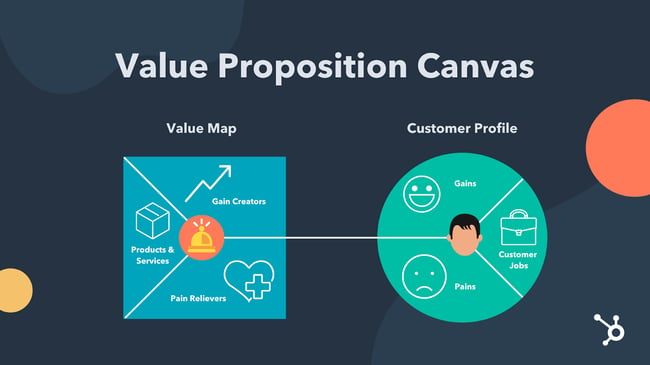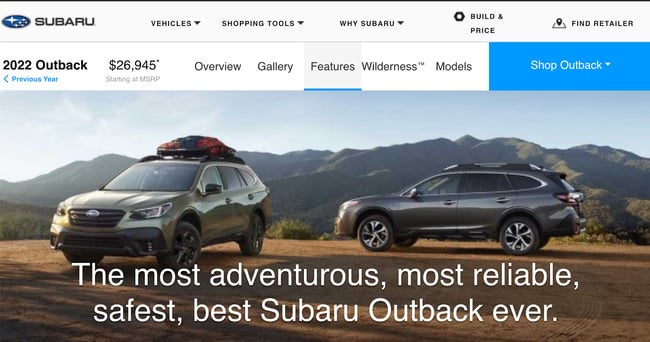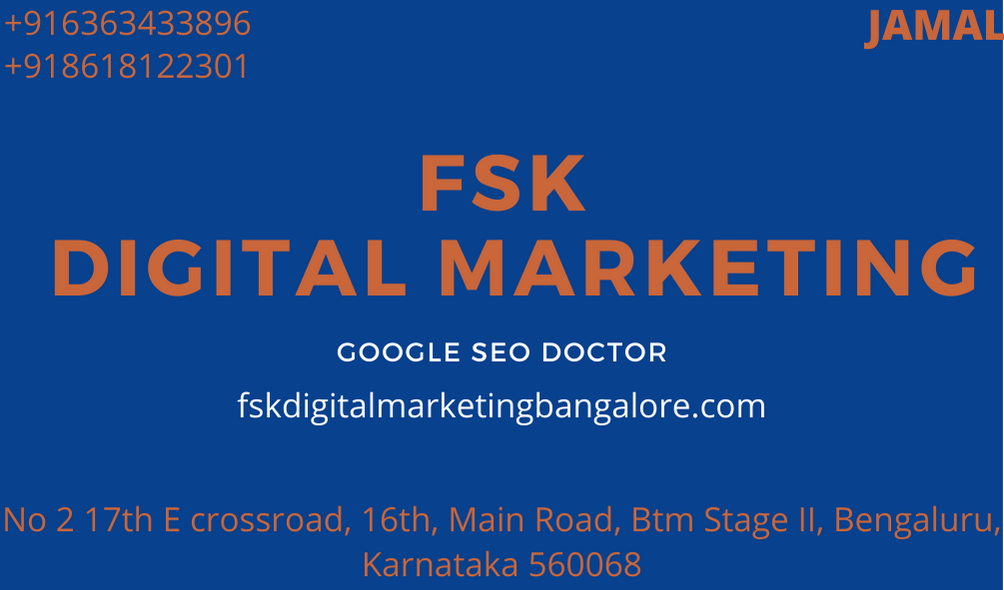How to Write a Great Value Proposition [+Examples]
Your value proposition is the core of your competitive advantage. It clearly articulates why someone would want to buy from your company instead of a competitor.
It's also one of the most important conversion factors (learn all about conversion best practices with this free guide). A great value proposition could be the difference between losing a sale — and closing it.
So how do you actually write a value proposition that's strong enough to lift conversion rates and sales? In this article, you’ll learn the definition of a value proposition, what a value prop isn't, tactics to create amazing value props, and examples of some of the best value props we’ve seen.
Ready to dive in?

Your value proposition is a unique identifier for your business. Without it, buyers won’t have a reason to purchase what you sell. They may even patronize a competitor simply because that business communicates its value proposition clearly in its marketing materials and sales process.
While your value prop should help differentiate you from the rest of the industry, keep in mind it's not a slogan, tagline, or mission statement. Those types of copy are important accessories to your brand, but your potential customers and employees don't choose one business over the other solely based on these elements.
Your value proposition goes deep into the problems you want to solve for buyers, and what makes your product or service the perfect solution.
The Elements of a Value Proposition
There are three main elements of a value proposition: the headline, the subheadline, and a visual element.
Headline
The headline of your value proposition describes the benefit the customer will receive as a result of making a purchase from your business. The headline can be creative and catchy, but it should be clear and concise first and foremost.
Subheadline or Paragraph
The subheadline or paragraph should explain in detail what your company offers, who it serves, and why. In this section, you can elaborate on the information in the headline.
Visual Element
In some cases, a video, infographic, or image may convey your value proposition better than words alone can. Enhance your message with these visual elements to capture your audience’s attention.
Step 1: Identify your customer's main problem.
While this will require some upfront research, you can get a head start on this aspect of the value proposition by speaking with different members of your team. Customer service reps, marketing specialists, and salespeople can fill in the gaps about what problems your customers are looking to solve by using your product or service.
For example, let’s say your business sells tax software on a subscription basis and automated templates are included in the software package. Your ideal customer is looking for an affordable and user-friendly way to access complicated tax documents for their business. In this example, your business’s offerings could be the solution they need.
Step 2: Identify all the benefits your products offer.
This step can be as simple as listing out every product you sell and describing its benefit. The benefit should be concise and focused on a single customer need.
In our tax software example, you’d list each tax template, explain the benefit it provides, and why a customer would need it.
Step 3: Describe what makes these benefits valuable.
Next, add another sentence that explains why this benefit matters to the customer.
Using the same example above, the value would be that customers have affordable tax documentation at their fingertips — something that would normally cost them thousands of dollars.
Step 4: Connect this value to your buyer's problem.
Next, pair the buyer’s problem to the elements that make your product or service valuable. Do they align? If so, you’re ready to refine your value proposition to differentiate your offerings from the competition. If they don’t align, repeat the steps above until you find a valid buyer need and a viable solution your business offers to meet that need.
Step 5: Differentiate yourself as the preferred provider of this value.
Finally, polish your value proposition to make it unique. Is there a specific customer service offering your business provides that others don’t? Do you offer any additional services that other companies charge for? These elements can help differentiate your value proposition from competitors while keeping the focus on the buyer’s needs.
1. Conduct research to determine the value proposition of your competitors.
Because your value proposition is the differentiating factor between your business and the competition, it’s important to research the propositions of your closest competitors. You can use the value proposition canvas below to determine how each company meets the needs of your buyer persona.
Be honest here — it’s tempting to focus on the areas in which your competition doesn’t excel, but you’ll have a better idea of where your product or service fits within the market if you key in on your competitors’ strengths.
2. Explain the value of your products and services.
You’re probably familiar with outlining the features and benefits of your product and service offerings. This tactic takes that concept a step further. By matching the benefits of your offerings to specific values that your customers have, you’ll be able to align what your business provides with what your customers need.
3. Describe the benefits your ideal customer will experience when they choose your product or service over the competition.
When crafting this part of your value proposition, include details about how your product or service will benefit the customer and use examples where you can. Videos, photos, and live demonstrations are all effective ways to illustrate your value proposition because they show the customer exactly what they can expect from your business.
4. Develop a unique value proposition for each buyer persona you serve.
Ideally, you’ll be focusing your marketing efforts on a specific target audience. You’ll also find that this audience will have different needs based on their buying behaviors. Buyer personas can help you segment your larger audience into groups of customers with similar desires, goals, pain points, and buying behaviors. As a result, you’ll need a unique value proposition for each persona. Different products and services you offer may solve certain customer pain points better than others, so developing a value proposition for each persona will better serve each one.
5. Test your value proposition with your audience using various marketing channels.
Each of these tactics will likely be developed internally by your team which means you’ll want to validate your work with your target audience. Your value proposition will be communicated through various marketing channels like your website, social media accounts, video, audio, and in person. Test your proposition with members of your audience (both existing customers and non-customers) using each of these channels. Tools like UserTesting can help you streamline this feedback process so that you can implement changes quickly to finalize your value proposition.
What makes a good value proposition?
Clear Language
Your value proposition should aim to address a primary customer need. This limited focus helps keep your value proposition clear and easy to understand. With just one main idea to comprehend, your audience will be able to quickly decide whether or not your product or service will be the best solution for them.
Specific Outcomes
Next, you’ll want to communicate the specific outcomes your customer can expect to receive from your product or service. Will they save time? Demonstrate how. Will their workflow become more manageable? Show a before and after workflow diagram. The specific outcomes will be critical components of your value proposition as they’ll exemplify exactly how your customers will use your solution to solve their problems.
Points of Differentiation
Not only are your potential customers evaluating your business’s offerings based on their own needs, but they’re also comparing what you offer against competitors. As a result, your value proposition will need to include detailed points of differentiation. These key points will help customers understand exactly what sets your company apart.
The value proposition canvas is made up of two major components: the customer profile and the value map.

Customer Profile
The customer profile makes up the first half of the value proposition canvas. When performing this exercise you’ll want to start with this section first so that their wants and needs can influence the overall value proposition canvas.
The customer profile consists of three areas that we’ll detail below.
Customer Jobs
What is the task your customer needs to complete or the problem they’re trying to solve with your product or service? The answer to this question sums up the “customer job” or the purpose of your product or service in the eyes of the customer.
Gains
No matter what you sell, your ideal customer will have an expectation of what that product or service will do for them. In this section, you’ll use research to explain what your customers expect from you in order to purchase your product.
Pains
As your customer completes their “customer job”, what pains do they experience? Do they take any risks while they do the customer’s job? Do they experience any negative emotions? These pain points should be considered so that you include the most helpful products and services on the value map side of the value proposition canvas.
Value Map
In this section of the value proposition canvas, three specific sectors help describe what the business offers to the customer.
Gain Creators
These are features your products or services have that make the customer happy. Think creatively about the elements of happiness your customers experience. Consider their financial and social goals as well as their psychographics.
Pain Relievers
In the section above, we discussed customer pains. This section will define exactly how your business will help them overcome those pain points.
Products and services
While this section won’t list every single product or service your company offers, it should include the ones that will create the most gain and alleviate the most pains for your customers.
Determine Value Proposition-Customer Fit
Once you’ve completed the value proposition canvas exercise, the next step will be to determine how your value proposition fits with the customer profile. To do this, you’ll use a ranking process that prioritizes products and services based on how well they address the customer profile.
The Best Value Proposition Examples
Because value propositions are typically internal information and rarely stated verbatim publicly, finding a value proposition example to model yours after can be difficult. We’ve taken the liberty of using the value proposition canvas and applying it to some successful companies that have been recognized by the American Customer Satisfaction Index (ASCI).
In these examples, you’ll see real-world instances of customer gains and pains aligned with well-known products and services offered by these companies.
Our Take On FedEx’s Value Proposition:
Headline: Manage Your Home Deliveries
Subheadline/Paragraph: Sending and receiving packages is convenient and safe for individuals who want to ship ideas and innovations across the globe.
Visual Element:

Customer Profile for FedEx |
|
|
Customer Jobs |
|
|
Gains |
|
|
Pains |
|
Value Map for FedEx |
|
|
Gain Creators |
|
|
Pain Relievers |
|
|
Products & Services |
|
Our Take On LG’s Value Proposition:
Headline: State-of-the-art Living Experience
Subheadline/Paragraph: LG SIGNATURE delivers an innovative product design that creates an exceptional living experience for people who want to achieve a state-of-the-art living experience.
Visual Element:

Customer Profile for LG |
|
|
Customer Jobs |
|
|
Gains |
|
|
Pains |
|
Value Map for lg |
|
|
Gain Creators |
|
|
Pain Relievers |
|
|
Products & Services |
|
Our Take On Subaru’s Value Proposition:
Headline: The most adventurous, most reliable, safest, best Subaru Outback ever.
Subheadline/paragraph: The 2022 Subaru Outback takes drivers to the most adventurous places in style with the most advanced safety technology.
Visual element:

Customer Profile for subaru |
|
|
Customer Jobs |
|
|
Gains |
|
|
Pains |
|
Value Map for Subaru |
|
|
Gain Creators |
|
|
Pain Relievers |
|
|
Products & Services |
|
Compose a Remarkable Value Proposition
The factors that influence a potential customer to become a loyal customer are limited. Whether your industry has a lot of opportunities to differentiate (like retail) or virtually no unique identifiers (like dairy), you’ll find that a value proposition will help you understand your ideal customer and position your business as the best solution for their needs. Use the tactics, tips, framework, and examples in this post to craft your unique value proposition.
Editor's note: This post was originally published in June 2018 and has been updated for comprehensiveness.
Digital marketing agency in darbhanga Digital marketing agency in patna Digital marketing agency in Muzaffarpur Digital marketing agency in bangalore Best Digital marketing agency in patna Top Digital marketing agency in patna Digital marketing course in patna local seo service in darbhanga local seo service in bangalore local seo service in patna local seo service in Muzaffarpur










0 Comments